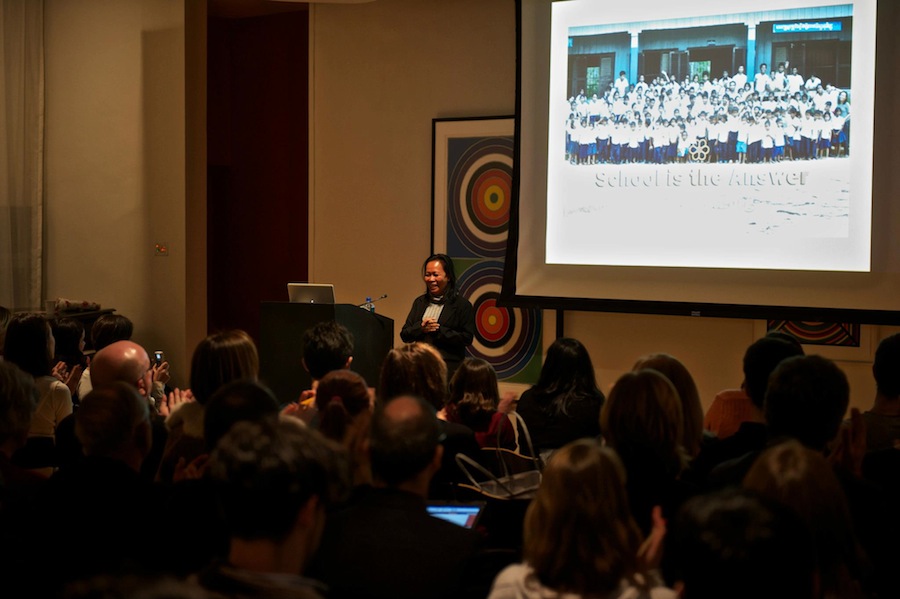
For five years now, The New School has sent students abroad to work with the Ponheary Ly foundation on providing education for disenfranchised children in rural Cambodia. Last week, for the first time, the founder of the foundation, Ponheary Ly and the president, Lori Carlson, came to speak at the New School.
“I think it’s a big deal for an international grassroots organization to come here,” said Christina Hiras, a New School senior who went abroad with Lang in Cambodia and worked with the foundation last summer. “They really got their point across.”
Ly, who grew up in Cambodia, was a teenager when the Khmer Rouge took control in 1975. This communist regime, led by Pol Pot, was determined to create a classless society by destroying the existing social system. One of Pol Pot’s mottos was, “To keep you is no gain, to destroy you is no loss.” The Khmer Rouge forced Ly’s family to the countryside, where they were put to work on collective farms, also known as “killing camps.” Life on these farms was filled with hard work, pain, and fear.
“We ate anything we could find,” Ly recalled at the New School event. “We ate leaves, insects and grass. Some people would eat poisonous insects or mushrooms and die.”
Ly witnessed the deaths of many people, who either starved to death or were killed by the Khmer Rouge soldiers. Ly’s father was killed due to his position as a teacher, which was considered to be a threat by the Khmer Rouge.
“My mother had to take care of us children alone,” said Ly. “She worked very hard and I appreciated her for that.”
The reign of the Khmer Rouge ended in 1979 and soon after Ly was able to attend school. Inspired by her father’s role as an educator, Ly went to teacher training school and became a primary school teacher. While teaching, she continued her education, and became fluent in French, Russian, and English.
In 1998 Ly began working as a tour guide and used the money she saved from tips to open up a guesthouse in Siem Reap, where New School students stay during their 5-week civic engagement program. She worked hard to improve education for the poor children she saw working in the temples.
“If I could encourage the tourists to give money to the children’s schools,” said Ly, “then they would start going to school instead of going to work.”
Lori Carlson was touring the region when she met Ly. Carlson ended up abandoning her career in the publishing business to start the Ponheary Ly Foundation. They founded schools to educate rural Cambodian youth, hoping that they will be able to lift their country out of poverty. Together, Ly and Carlson started providing food and clean water for weak and sick children. They saw the children become healthier and stronger, and eventually the entire village began to use their clean-water supply.
“After one year, no children had died,” said Calson. “This was the first time that this had ever happened in the village. That no children had died within one year.”
For the first time, children in these villages were also continuing on to grades 4, 5, and 6. In 2009, the first children graduated from grade 6 and wanted to go to secondary school. As a response, the foundation built a home for children to live in while attending another school ten miles away.
At first, parents were ambivalent at the idea of sending their children to school. Many, suffering from PTSD from the Khmer Rouge era, were neglectful and abusive towards their children, and preferred their boys to work in the rice-fields.
“The parents started showing a sense of pride in their children,” said Carlson. “They were ready to send their kids to school.”
At the end of their speech at the New School, Ly and Carlson played a short film called “The Sunflowers of Srayang” made by students from another town in Cambodia. The young students documented the stories of the children at Ponheary foundation schools so they could share their stories and advice with the world.
“To students around the world,” read the subtitles, as a girl on screen spoke. “Please do not give up on your studies. Even if you are old, you can still study. And study more and more.”
Ly told the audience that by educating a new generation of Cambodians, she hopes to finally “light a candle” in the darkness left by the Khmer Rouge.







Leave a Reply